Business Law Assignment: Contract, Negligence, and Liability
VerifiedAdded on 2022/08/26
|13
|3566
|25
Homework Assignment
AI Summary
This assignment delves into two key areas of business law: contract law and the law of negligence. Part 1 examines the enforceability of promises made by Sergio to various individuals (his son, secretary, and a newsagent), analyzing the essential elements of a valid contract, including offer, acceptance, intention, consideration, and the impact of breach of contract. It references landmark cases such as Bettini v. Gye, Poussard v. Spiers and Pond, Schuler AG v. Wickman Machine Tool Sales Ltd, and Dunlop Pneumatic Tyre Co Ltd v Selfridge Ltd to illustrate legal principles. Part 2 addresses a negligence claim against Extortionate PLC, a bank, concerning injuries sustained by Samantha due to hazardous conditions on the premises. It explores the duty of care owed by businesses to their customers, referencing cases like Donoghue v. Stevenson, Smoldon v. Whitworth & Nolan, Dominion Natural Gas v. Collins and Perkins, and Haynes v. Harwood to establish the bank's potential liability for Samantha's injuries. The assignment demonstrates how legal principles are applied to real-world scenarios, offering a comprehensive understanding of contract and tort law within a business context.
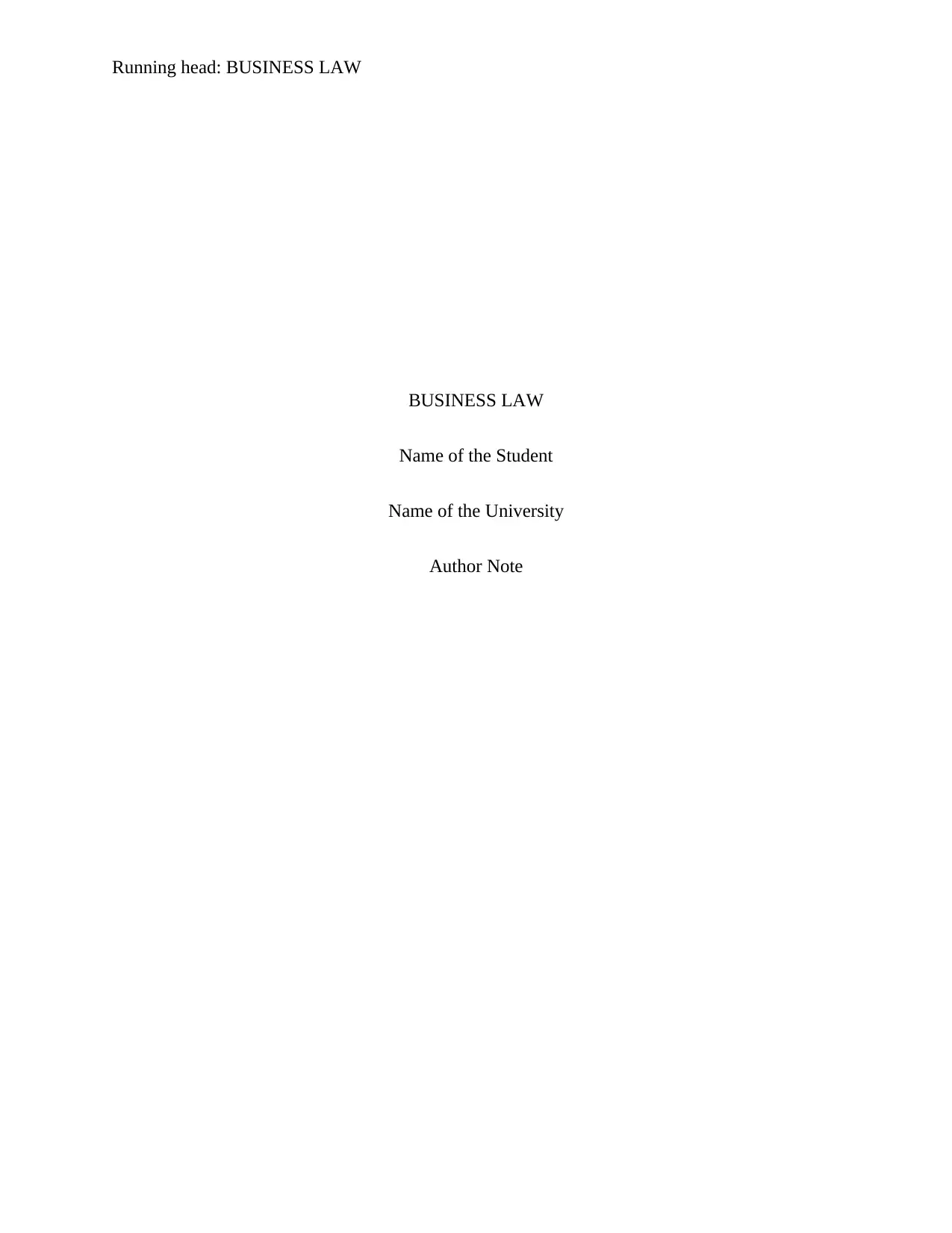
Running head: BUSINESS LAW
BUSINESS LAW
Name of the Student
Name of the University
Author Note
BUSINESS LAW
Name of the Student
Name of the University
Author Note
Paraphrase This Document
Need a fresh take? Get an instant paraphrase of this document with our AI Paraphraser
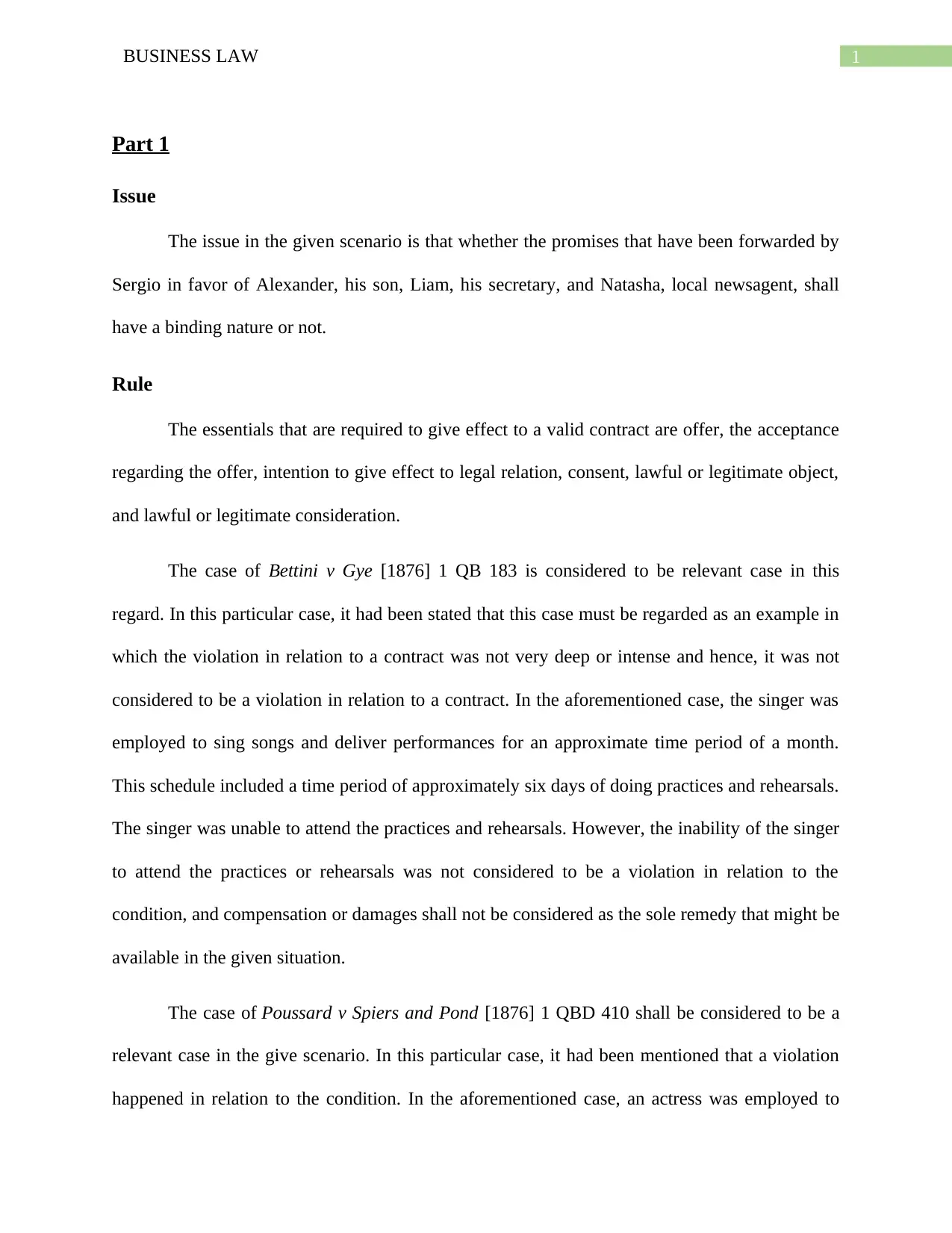
1BUSINESS LAW
Part 1
Issue
The issue in the given scenario is that whether the promises that have been forwarded by
Sergio in favor of Alexander, his son, Liam, his secretary, and Natasha, local newsagent, shall
have a binding nature or not.
Rule
The essentials that are required to give effect to a valid contract are offer, the acceptance
regarding the offer, intention to give effect to legal relation, consent, lawful or legitimate object,
and lawful or legitimate consideration.
The case of Bettini v Gye [1876] 1 QB 183 is considered to be relevant case in this
regard. In this particular case, it had been stated that this case must be regarded as an example in
which the violation in relation to a contract was not very deep or intense and hence, it was not
considered to be a violation in relation to a contract. In the aforementioned case, the singer was
employed to sing songs and deliver performances for an approximate time period of a month.
This schedule included a time period of approximately six days of doing practices and rehearsals.
The singer was unable to attend the practices and rehearsals. However, the inability of the singer
to attend the practices or rehearsals was not considered to be a violation in relation to the
condition, and compensation or damages shall not be considered as the sole remedy that might be
available in the given situation.
The case of Poussard v Spiers and Pond [1876] 1 QBD 410 shall be considered to be a
relevant case in the give scenario. In this particular case, it had been mentioned that a violation
happened in relation to the condition. In the aforementioned case, an actress was employed to
Part 1
Issue
The issue in the given scenario is that whether the promises that have been forwarded by
Sergio in favor of Alexander, his son, Liam, his secretary, and Natasha, local newsagent, shall
have a binding nature or not.
Rule
The essentials that are required to give effect to a valid contract are offer, the acceptance
regarding the offer, intention to give effect to legal relation, consent, lawful or legitimate object,
and lawful or legitimate consideration.
The case of Bettini v Gye [1876] 1 QB 183 is considered to be relevant case in this
regard. In this particular case, it had been stated that this case must be regarded as an example in
which the violation in relation to a contract was not very deep or intense and hence, it was not
considered to be a violation in relation to a contract. In the aforementioned case, the singer was
employed to sing songs and deliver performances for an approximate time period of a month.
This schedule included a time period of approximately six days of doing practices and rehearsals.
The singer was unable to attend the practices and rehearsals. However, the inability of the singer
to attend the practices or rehearsals was not considered to be a violation in relation to the
condition, and compensation or damages shall not be considered as the sole remedy that might be
available in the given situation.
The case of Poussard v Spiers and Pond [1876] 1 QBD 410 shall be considered to be a
relevant case in the give scenario. In this particular case, it had been mentioned that a violation
happened in relation to the condition. In the aforementioned case, an actress was employed to
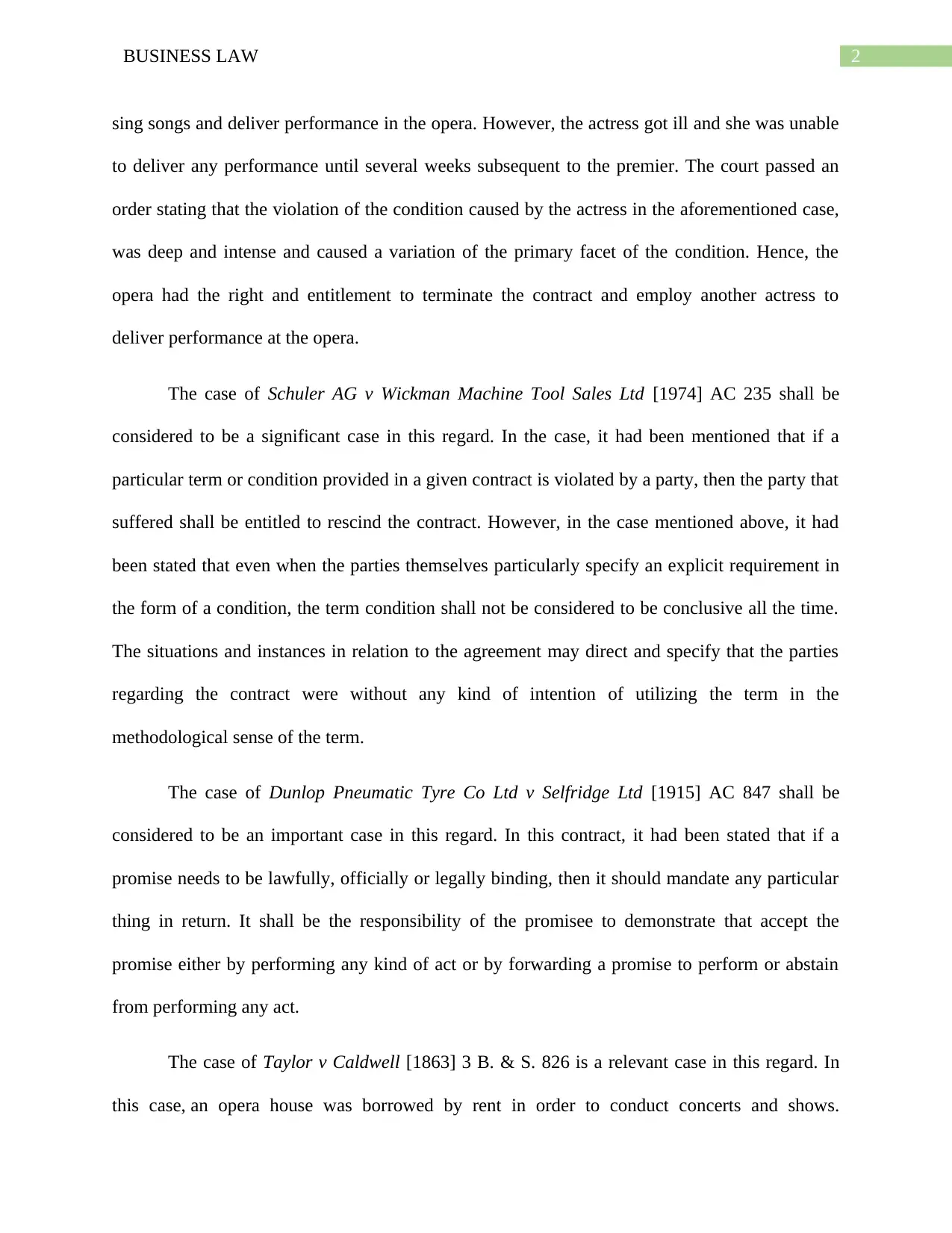
2BUSINESS LAW
sing songs and deliver performance in the opera. However, the actress got ill and she was unable
to deliver any performance until several weeks subsequent to the premier. The court passed an
order stating that the violation of the condition caused by the actress in the aforementioned case,
was deep and intense and caused a variation of the primary facet of the condition. Hence, the
opera had the right and entitlement to terminate the contract and employ another actress to
deliver performance at the opera.
The case of Schuler AG v Wickman Machine Tool Sales Ltd [1974] AC 235 shall be
considered to be a significant case in this regard. In the case, it had been mentioned that if a
particular term or condition provided in a given contract is violated by a party, then the party that
suffered shall be entitled to rescind the contract. However, in the case mentioned above, it had
been stated that even when the parties themselves particularly specify an explicit requirement in
the form of a condition, the term condition shall not be considered to be conclusive all the time.
The situations and instances in relation to the agreement may direct and specify that the parties
regarding the contract were without any kind of intention of utilizing the term in the
methodological sense of the term.
The case of Dunlop Pneumatic Tyre Co Ltd v Selfridge Ltd [1915] AC 847 shall be
considered to be an important case in this regard. In this contract, it had been stated that if a
promise needs to be lawfully, officially or legally binding, then it should mandate any particular
thing in return. It shall be the responsibility of the promisee to demonstrate that accept the
promise either by performing any kind of act or by forwarding a promise to perform or abstain
from performing any act.
The case of Taylor v Caldwell [1863] 3 B. & S. 826 is a relevant case in this regard. In
this case, an opera house was borrowed by rent in order to conduct concerts and shows.
sing songs and deliver performance in the opera. However, the actress got ill and she was unable
to deliver any performance until several weeks subsequent to the premier. The court passed an
order stating that the violation of the condition caused by the actress in the aforementioned case,
was deep and intense and caused a variation of the primary facet of the condition. Hence, the
opera had the right and entitlement to terminate the contract and employ another actress to
deliver performance at the opera.
The case of Schuler AG v Wickman Machine Tool Sales Ltd [1974] AC 235 shall be
considered to be a significant case in this regard. In the case, it had been mentioned that if a
particular term or condition provided in a given contract is violated by a party, then the party that
suffered shall be entitled to rescind the contract. However, in the case mentioned above, it had
been stated that even when the parties themselves particularly specify an explicit requirement in
the form of a condition, the term condition shall not be considered to be conclusive all the time.
The situations and instances in relation to the agreement may direct and specify that the parties
regarding the contract were without any kind of intention of utilizing the term in the
methodological sense of the term.
The case of Dunlop Pneumatic Tyre Co Ltd v Selfridge Ltd [1915] AC 847 shall be
considered to be an important case in this regard. In this contract, it had been stated that if a
promise needs to be lawfully, officially or legally binding, then it should mandate any particular
thing in return. It shall be the responsibility of the promisee to demonstrate that accept the
promise either by performing any kind of act or by forwarding a promise to perform or abstain
from performing any act.
The case of Taylor v Caldwell [1863] 3 B. & S. 826 is a relevant case in this regard. In
this case, an opera house was borrowed by rent in order to conduct concerts and shows.
⊘ This is a preview!⊘
Do you want full access?
Subscribe today to unlock all pages.

Trusted by 1+ million students worldwide
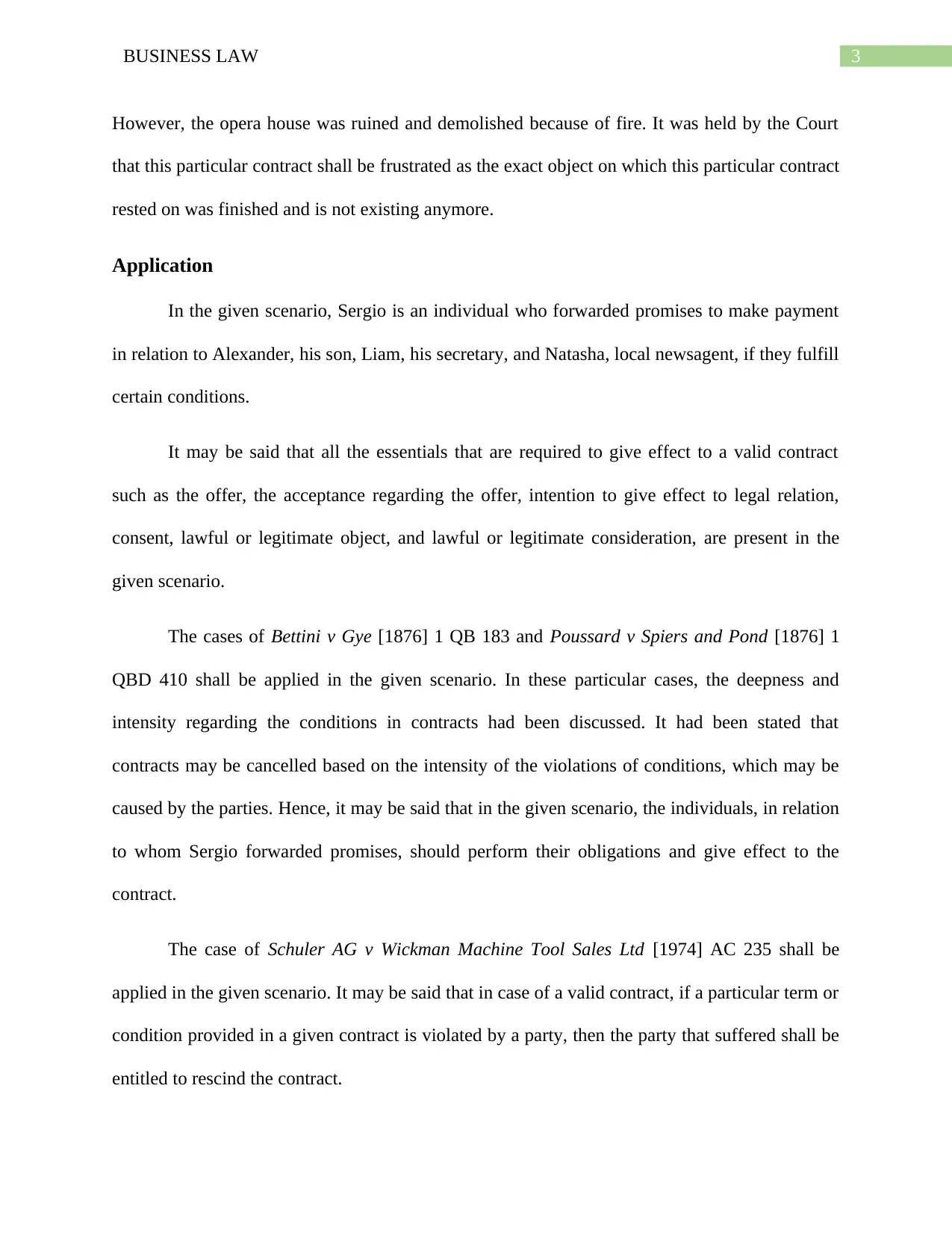
3BUSINESS LAW
However, the opera house was ruined and demolished because of fire. It was held by the Court
that this particular contract shall be frustrated as the exact object on which this particular contract
rested on was finished and is not existing anymore.
Application
In the given scenario, Sergio is an individual who forwarded promises to make payment
in relation to Alexander, his son, Liam, his secretary, and Natasha, local newsagent, if they fulfill
certain conditions.
It may be said that all the essentials that are required to give effect to a valid contract
such as the offer, the acceptance regarding the offer, intention to give effect to legal relation,
consent, lawful or legitimate object, and lawful or legitimate consideration, are present in the
given scenario.
The cases of Bettini v Gye [1876] 1 QB 183 and Poussard v Spiers and Pond [1876] 1
QBD 410 shall be applied in the given scenario. In these particular cases, the deepness and
intensity regarding the conditions in contracts had been discussed. It had been stated that
contracts may be cancelled based on the intensity of the violations of conditions, which may be
caused by the parties. Hence, it may be said that in the given scenario, the individuals, in relation
to whom Sergio forwarded promises, should perform their obligations and give effect to the
contract.
The case of Schuler AG v Wickman Machine Tool Sales Ltd [1974] AC 235 shall be
applied in the given scenario. It may be said that in case of a valid contract, if a particular term or
condition provided in a given contract is violated by a party, then the party that suffered shall be
entitled to rescind the contract.
However, the opera house was ruined and demolished because of fire. It was held by the Court
that this particular contract shall be frustrated as the exact object on which this particular contract
rested on was finished and is not existing anymore.
Application
In the given scenario, Sergio is an individual who forwarded promises to make payment
in relation to Alexander, his son, Liam, his secretary, and Natasha, local newsagent, if they fulfill
certain conditions.
It may be said that all the essentials that are required to give effect to a valid contract
such as the offer, the acceptance regarding the offer, intention to give effect to legal relation,
consent, lawful or legitimate object, and lawful or legitimate consideration, are present in the
given scenario.
The cases of Bettini v Gye [1876] 1 QB 183 and Poussard v Spiers and Pond [1876] 1
QBD 410 shall be applied in the given scenario. In these particular cases, the deepness and
intensity regarding the conditions in contracts had been discussed. It had been stated that
contracts may be cancelled based on the intensity of the violations of conditions, which may be
caused by the parties. Hence, it may be said that in the given scenario, the individuals, in relation
to whom Sergio forwarded promises, should perform their obligations and give effect to the
contract.
The case of Schuler AG v Wickman Machine Tool Sales Ltd [1974] AC 235 shall be
applied in the given scenario. It may be said that in case of a valid contract, if a particular term or
condition provided in a given contract is violated by a party, then the party that suffered shall be
entitled to rescind the contract.
Paraphrase This Document
Need a fresh take? Get an instant paraphrase of this document with our AI Paraphraser
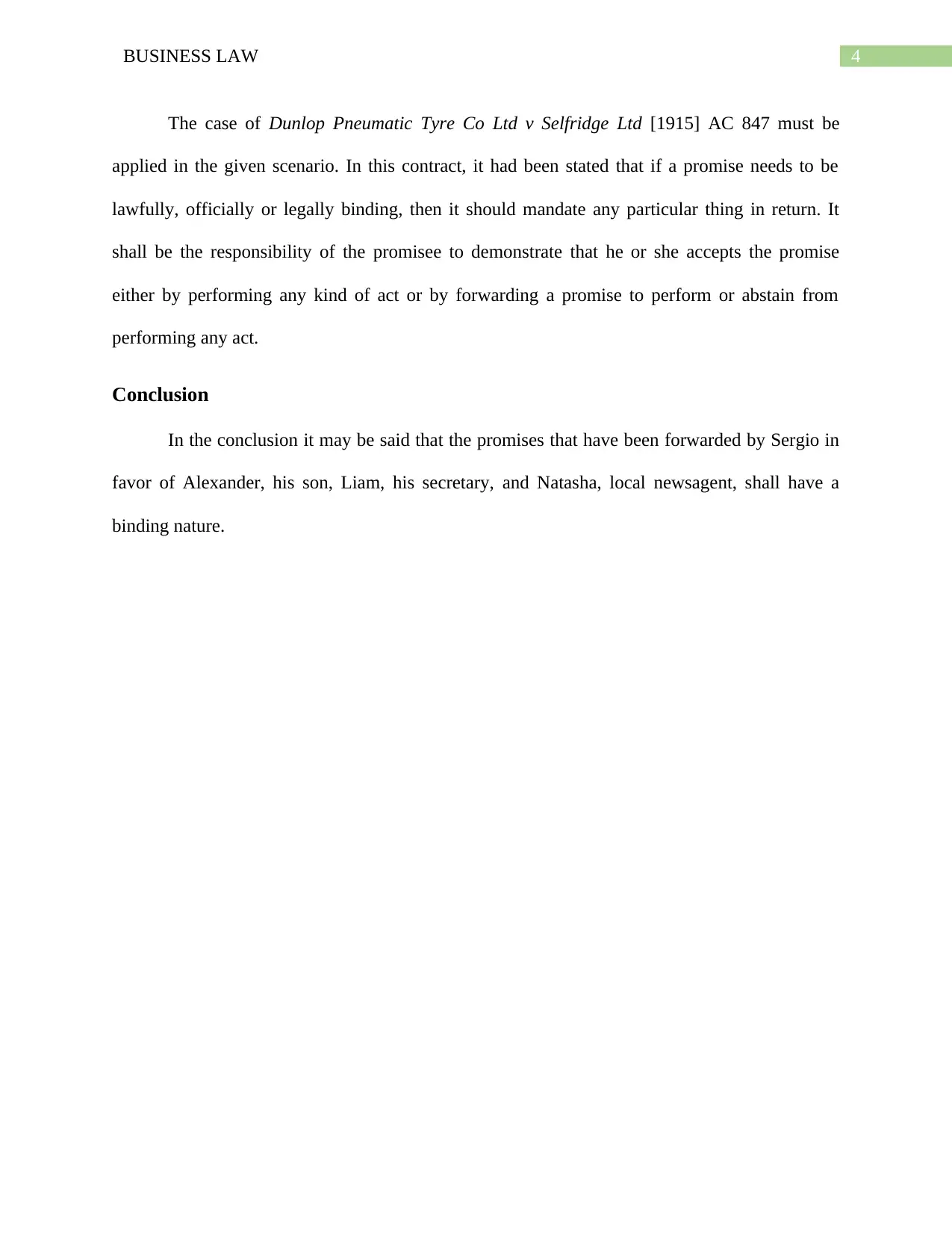
4BUSINESS LAW
The case of Dunlop Pneumatic Tyre Co Ltd v Selfridge Ltd [1915] AC 847 must be
applied in the given scenario. In this contract, it had been stated that if a promise needs to be
lawfully, officially or legally binding, then it should mandate any particular thing in return. It
shall be the responsibility of the promisee to demonstrate that he or she accepts the promise
either by performing any kind of act or by forwarding a promise to perform or abstain from
performing any act.
Conclusion
In the conclusion it may be said that the promises that have been forwarded by Sergio in
favor of Alexander, his son, Liam, his secretary, and Natasha, local newsagent, shall have a
binding nature.
The case of Dunlop Pneumatic Tyre Co Ltd v Selfridge Ltd [1915] AC 847 must be
applied in the given scenario. In this contract, it had been stated that if a promise needs to be
lawfully, officially or legally binding, then it should mandate any particular thing in return. It
shall be the responsibility of the promisee to demonstrate that he or she accepts the promise
either by performing any kind of act or by forwarding a promise to perform or abstain from
performing any act.
Conclusion
In the conclusion it may be said that the promises that have been forwarded by Sergio in
favor of Alexander, his son, Liam, his secretary, and Natasha, local newsagent, shall have a
binding nature.
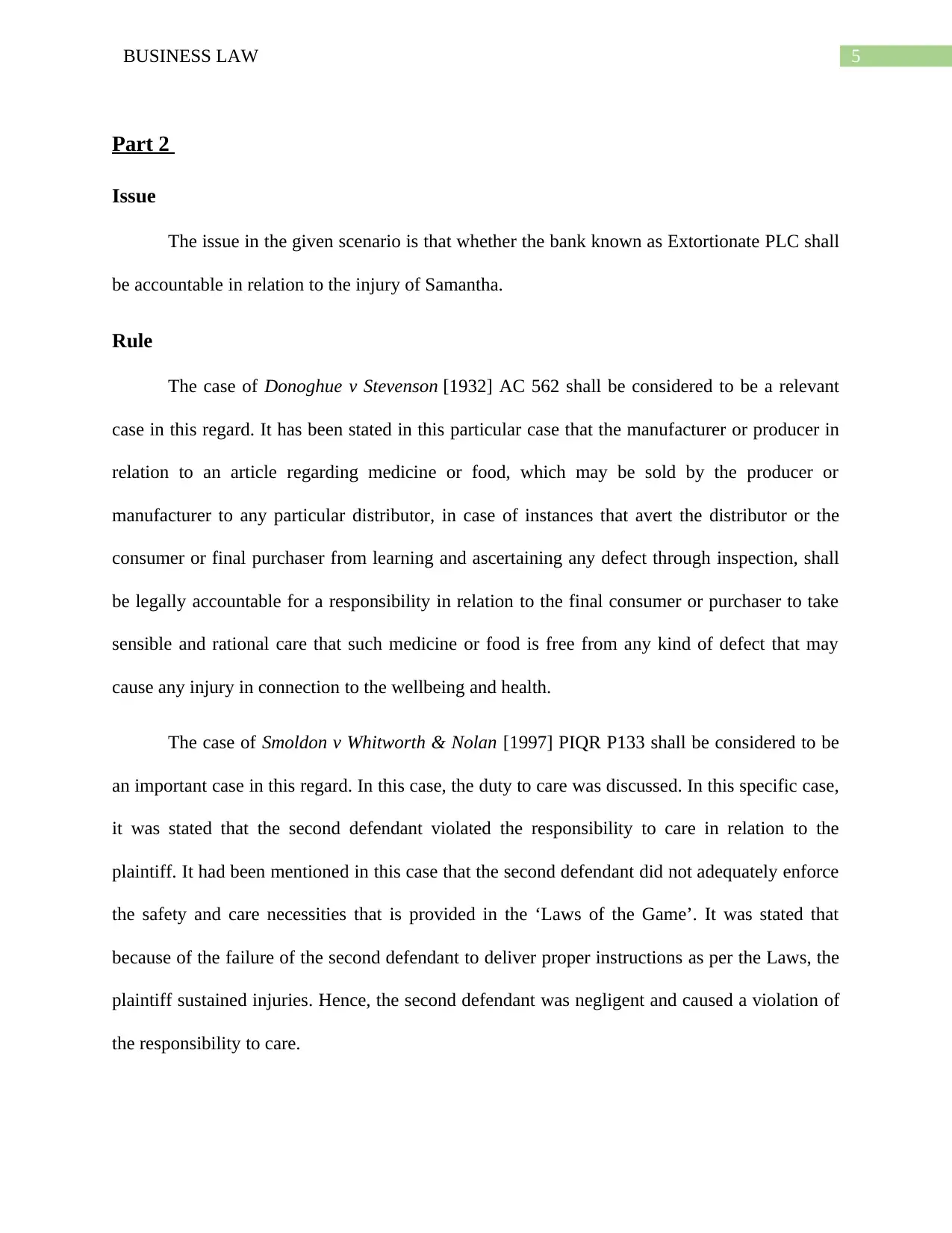
5BUSINESS LAW
Part 2
Issue
The issue in the given scenario is that whether the bank known as Extortionate PLC shall
be accountable in relation to the injury of Samantha.
Rule
The case of Donoghue v Stevenson [1932] AC 562 shall be considered to be a relevant
case in this regard. It has been stated in this particular case that the manufacturer or producer in
relation to an article regarding medicine or food, which may be sold by the producer or
manufacturer to any particular distributor, in case of instances that avert the distributor or the
consumer or final purchaser from learning and ascertaining any defect through inspection, shall
be legally accountable for a responsibility in relation to the final consumer or purchaser to take
sensible and rational care that such medicine or food is free from any kind of defect that may
cause any injury in connection to the wellbeing and health.
The case of Smoldon v Whitworth & Nolan [1997] PIQR P133 shall be considered to be
an important case in this regard. In this case, the duty to care was discussed. In this specific case,
it was stated that the second defendant violated the responsibility to care in relation to the
plaintiff. It had been mentioned in this case that the second defendant did not adequately enforce
the safety and care necessities that is provided in the ‘Laws of the Game’. It was stated that
because of the failure of the second defendant to deliver proper instructions as per the Laws, the
plaintiff sustained injuries. Hence, the second defendant was negligent and caused a violation of
the responsibility to care.
Part 2
Issue
The issue in the given scenario is that whether the bank known as Extortionate PLC shall
be accountable in relation to the injury of Samantha.
Rule
The case of Donoghue v Stevenson [1932] AC 562 shall be considered to be a relevant
case in this regard. It has been stated in this particular case that the manufacturer or producer in
relation to an article regarding medicine or food, which may be sold by the producer or
manufacturer to any particular distributor, in case of instances that avert the distributor or the
consumer or final purchaser from learning and ascertaining any defect through inspection, shall
be legally accountable for a responsibility in relation to the final consumer or purchaser to take
sensible and rational care that such medicine or food is free from any kind of defect that may
cause any injury in connection to the wellbeing and health.
The case of Smoldon v Whitworth & Nolan [1997] PIQR P133 shall be considered to be
an important case in this regard. In this case, the duty to care was discussed. In this specific case,
it was stated that the second defendant violated the responsibility to care in relation to the
plaintiff. It had been mentioned in this case that the second defendant did not adequately enforce
the safety and care necessities that is provided in the ‘Laws of the Game’. It was stated that
because of the failure of the second defendant to deliver proper instructions as per the Laws, the
plaintiff sustained injuries. Hence, the second defendant was negligent and caused a violation of
the responsibility to care.
⊘ This is a preview!⊘
Do you want full access?
Subscribe today to unlock all pages.

Trusted by 1+ million students worldwide
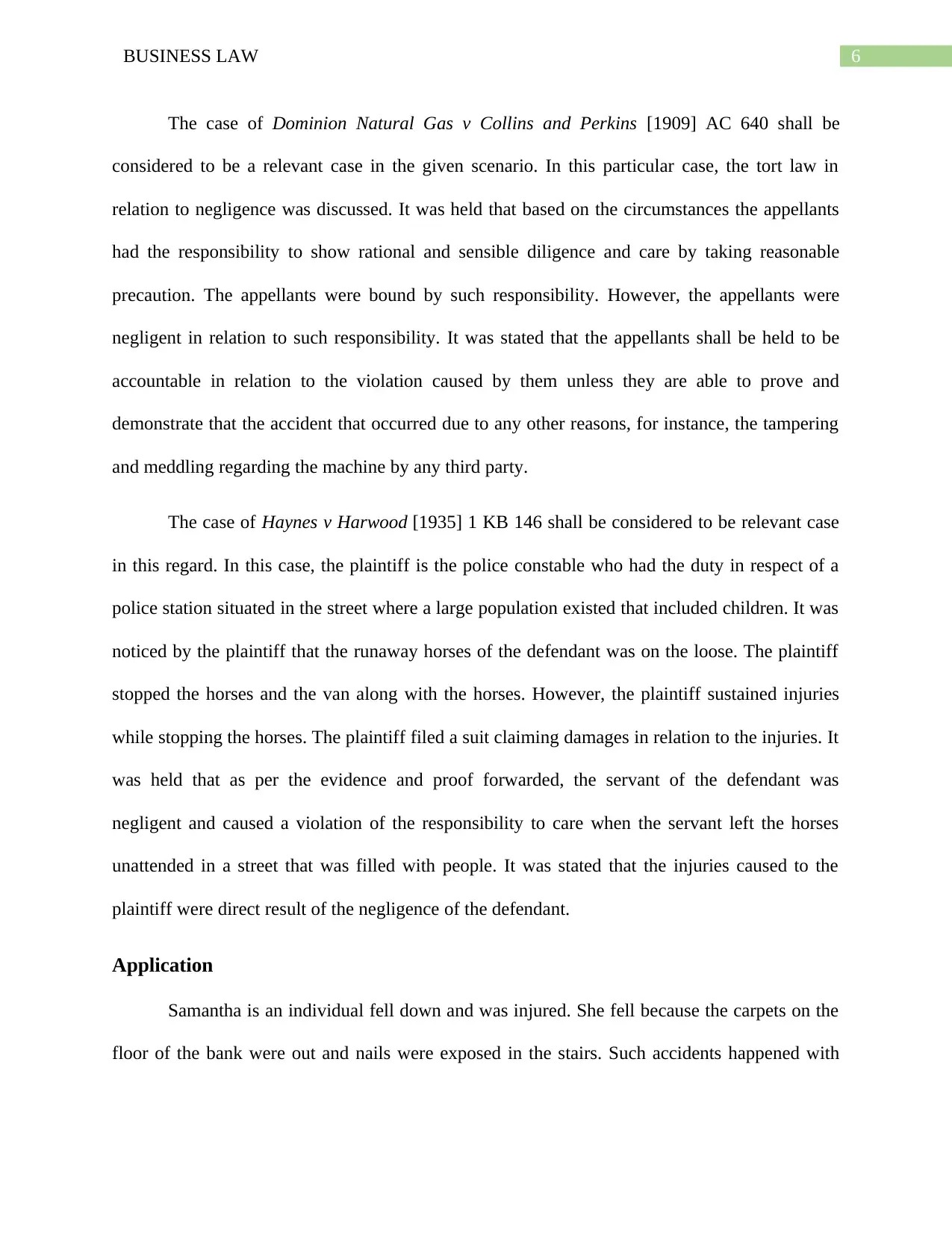
6BUSINESS LAW
The case of Dominion Natural Gas v Collins and Perkins [1909] AC 640 shall be
considered to be a relevant case in the given scenario. In this particular case, the tort law in
relation to negligence was discussed. It was held that based on the circumstances the appellants
had the responsibility to show rational and sensible diligence and care by taking reasonable
precaution. The appellants were bound by such responsibility. However, the appellants were
negligent in relation to such responsibility. It was stated that the appellants shall be held to be
accountable in relation to the violation caused by them unless they are able to prove and
demonstrate that the accident that occurred due to any other reasons, for instance, the tampering
and meddling regarding the machine by any third party.
The case of Haynes v Harwood [1935] 1 KB 146 shall be considered to be relevant case
in this regard. In this case, the plaintiff is the police constable who had the duty in respect of a
police station situated in the street where a large population existed that included children. It was
noticed by the plaintiff that the runaway horses of the defendant was on the loose. The plaintiff
stopped the horses and the van along with the horses. However, the plaintiff sustained injuries
while stopping the horses. The plaintiff filed a suit claiming damages in relation to the injuries. It
was held that as per the evidence and proof forwarded, the servant of the defendant was
negligent and caused a violation of the responsibility to care when the servant left the horses
unattended in a street that was filled with people. It was stated that the injuries caused to the
plaintiff were direct result of the negligence of the defendant.
Application
Samantha is an individual fell down and was injured. She fell because the carpets on the
floor of the bank were out and nails were exposed in the stairs. Such accidents happened with
The case of Dominion Natural Gas v Collins and Perkins [1909] AC 640 shall be
considered to be a relevant case in the given scenario. In this particular case, the tort law in
relation to negligence was discussed. It was held that based on the circumstances the appellants
had the responsibility to show rational and sensible diligence and care by taking reasonable
precaution. The appellants were bound by such responsibility. However, the appellants were
negligent in relation to such responsibility. It was stated that the appellants shall be held to be
accountable in relation to the violation caused by them unless they are able to prove and
demonstrate that the accident that occurred due to any other reasons, for instance, the tampering
and meddling regarding the machine by any third party.
The case of Haynes v Harwood [1935] 1 KB 146 shall be considered to be relevant case
in this regard. In this case, the plaintiff is the police constable who had the duty in respect of a
police station situated in the street where a large population existed that included children. It was
noticed by the plaintiff that the runaway horses of the defendant was on the loose. The plaintiff
stopped the horses and the van along with the horses. However, the plaintiff sustained injuries
while stopping the horses. The plaintiff filed a suit claiming damages in relation to the injuries. It
was held that as per the evidence and proof forwarded, the servant of the defendant was
negligent and caused a violation of the responsibility to care when the servant left the horses
unattended in a street that was filled with people. It was stated that the injuries caused to the
plaintiff were direct result of the negligence of the defendant.
Application
Samantha is an individual fell down and was injured. She fell because the carpets on the
floor of the bank were out and nails were exposed in the stairs. Such accidents happened with
Paraphrase This Document
Need a fresh take? Get an instant paraphrase of this document with our AI Paraphraser
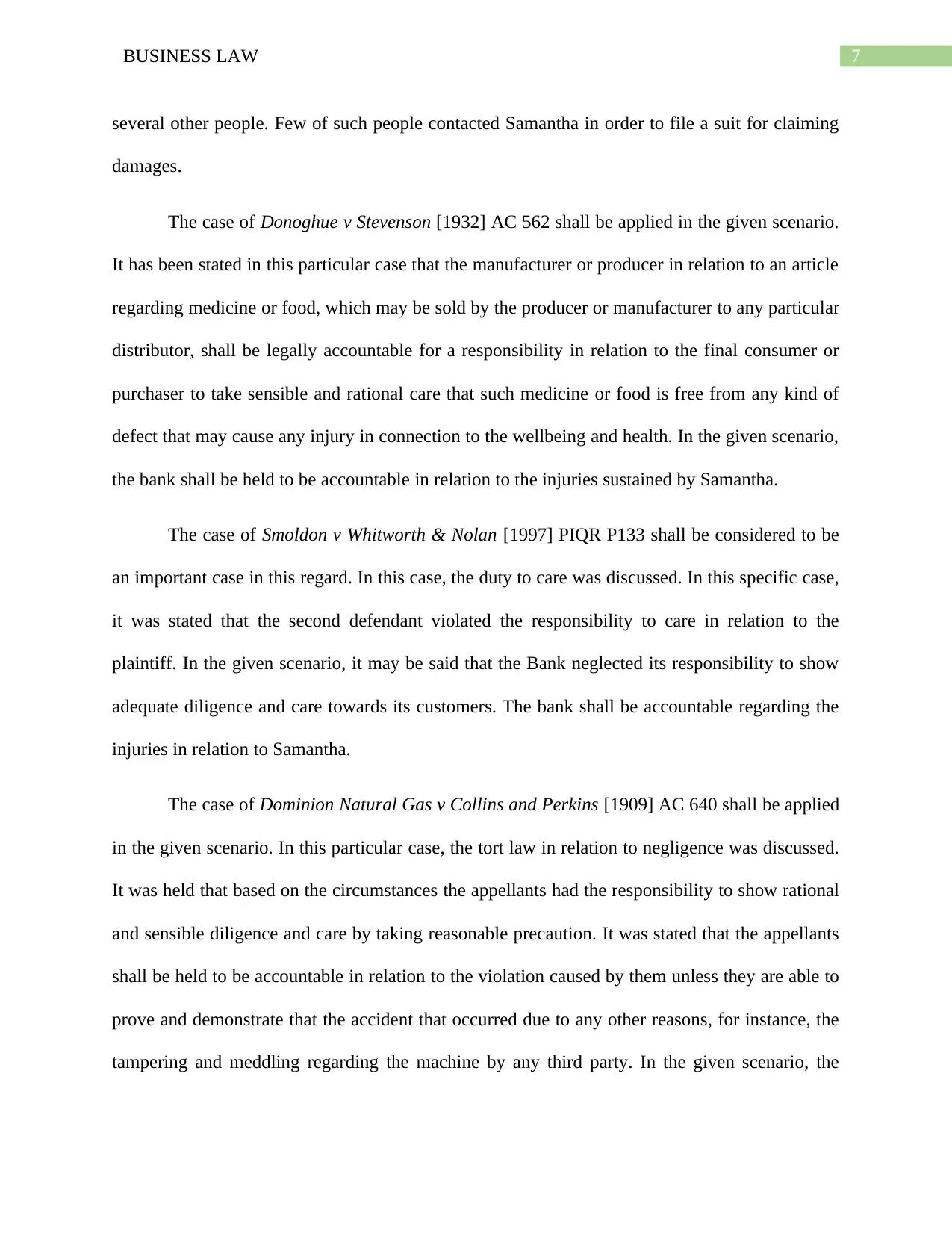
7BUSINESS LAW
several other people. Few of such people contacted Samantha in order to file a suit for claiming
damages.
The case of Donoghue v Stevenson [1932] AC 562 shall be applied in the given scenario.
It has been stated in this particular case that the manufacturer or producer in relation to an article
regarding medicine or food, which may be sold by the producer or manufacturer to any particular
distributor, shall be legally accountable for a responsibility in relation to the final consumer or
purchaser to take sensible and rational care that such medicine or food is free from any kind of
defect that may cause any injury in connection to the wellbeing and health. In the given scenario,
the bank shall be held to be accountable in relation to the injuries sustained by Samantha.
The case of Smoldon v Whitworth & Nolan [1997] PIQR P133 shall be considered to be
an important case in this regard. In this case, the duty to care was discussed. In this specific case,
it was stated that the second defendant violated the responsibility to care in relation to the
plaintiff. In the given scenario, it may be said that the Bank neglected its responsibility to show
adequate diligence and care towards its customers. The bank shall be accountable regarding the
injuries in relation to Samantha.
The case of Dominion Natural Gas v Collins and Perkins [1909] AC 640 shall be applied
in the given scenario. In this particular case, the tort law in relation to negligence was discussed.
It was held that based on the circumstances the appellants had the responsibility to show rational
and sensible diligence and care by taking reasonable precaution. It was stated that the appellants
shall be held to be accountable in relation to the violation caused by them unless they are able to
prove and demonstrate that the accident that occurred due to any other reasons, for instance, the
tampering and meddling regarding the machine by any third party. In the given scenario, the
several other people. Few of such people contacted Samantha in order to file a suit for claiming
damages.
The case of Donoghue v Stevenson [1932] AC 562 shall be applied in the given scenario.
It has been stated in this particular case that the manufacturer or producer in relation to an article
regarding medicine or food, which may be sold by the producer or manufacturer to any particular
distributor, shall be legally accountable for a responsibility in relation to the final consumer or
purchaser to take sensible and rational care that such medicine or food is free from any kind of
defect that may cause any injury in connection to the wellbeing and health. In the given scenario,
the bank shall be held to be accountable in relation to the injuries sustained by Samantha.
The case of Smoldon v Whitworth & Nolan [1997] PIQR P133 shall be considered to be
an important case in this regard. In this case, the duty to care was discussed. In this specific case,
it was stated that the second defendant violated the responsibility to care in relation to the
plaintiff. In the given scenario, it may be said that the Bank neglected its responsibility to show
adequate diligence and care towards its customers. The bank shall be accountable regarding the
injuries in relation to Samantha.
The case of Dominion Natural Gas v Collins and Perkins [1909] AC 640 shall be applied
in the given scenario. In this particular case, the tort law in relation to negligence was discussed.
It was held that based on the circumstances the appellants had the responsibility to show rational
and sensible diligence and care by taking reasonable precaution. It was stated that the appellants
shall be held to be accountable in relation to the violation caused by them unless they are able to
prove and demonstrate that the accident that occurred due to any other reasons, for instance, the
tampering and meddling regarding the machine by any third party. In the given scenario, the
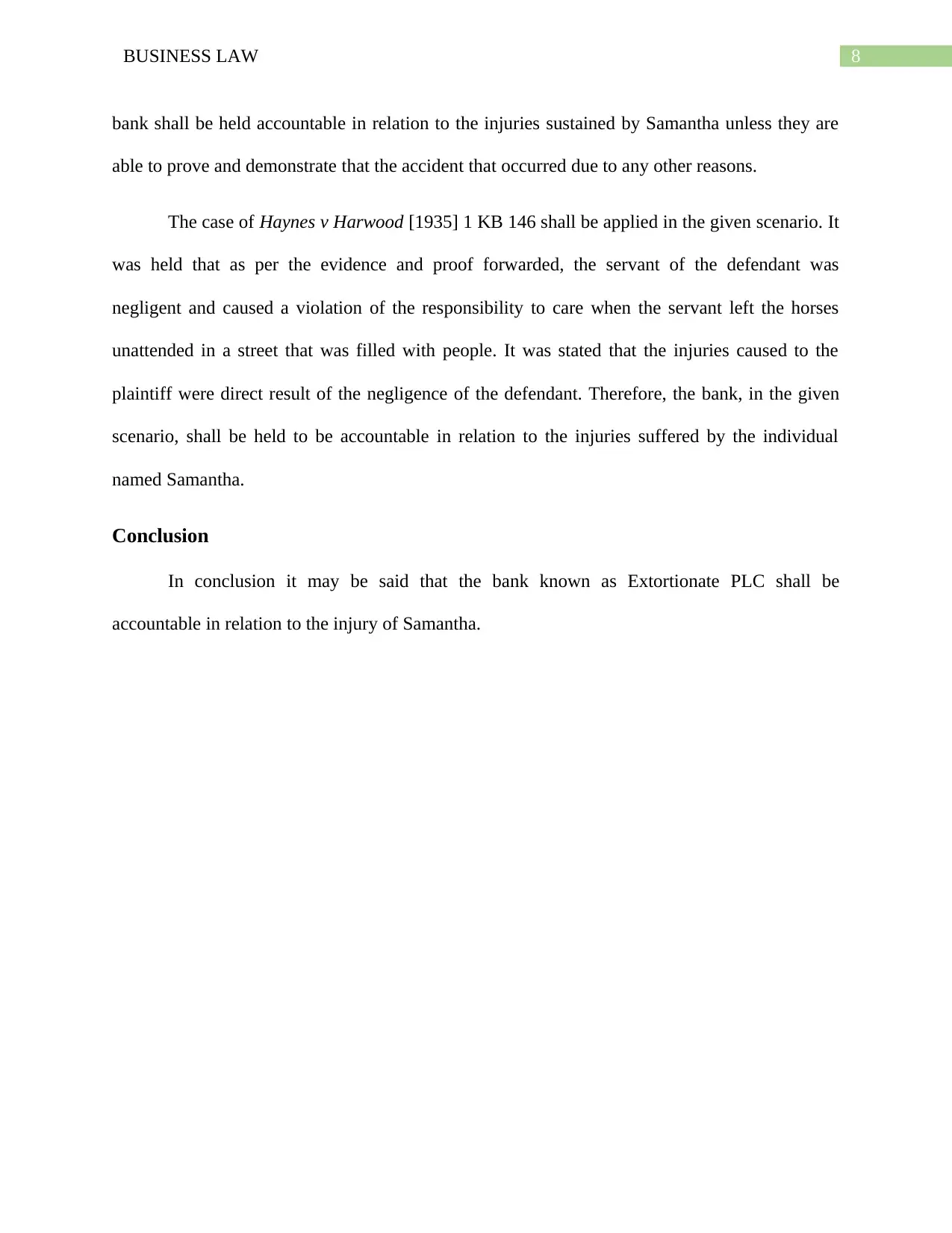
8BUSINESS LAW
bank shall be held accountable in relation to the injuries sustained by Samantha unless they are
able to prove and demonstrate that the accident that occurred due to any other reasons.
The case of Haynes v Harwood [1935] 1 KB 146 shall be applied in the given scenario. It
was held that as per the evidence and proof forwarded, the servant of the defendant was
negligent and caused a violation of the responsibility to care when the servant left the horses
unattended in a street that was filled with people. It was stated that the injuries caused to the
plaintiff were direct result of the negligence of the defendant. Therefore, the bank, in the given
scenario, shall be held to be accountable in relation to the injuries suffered by the individual
named Samantha.
Conclusion
In conclusion it may be said that the bank known as Extortionate PLC shall be
accountable in relation to the injury of Samantha.
bank shall be held accountable in relation to the injuries sustained by Samantha unless they are
able to prove and demonstrate that the accident that occurred due to any other reasons.
The case of Haynes v Harwood [1935] 1 KB 146 shall be applied in the given scenario. It
was held that as per the evidence and proof forwarded, the servant of the defendant was
negligent and caused a violation of the responsibility to care when the servant left the horses
unattended in a street that was filled with people. It was stated that the injuries caused to the
plaintiff were direct result of the negligence of the defendant. Therefore, the bank, in the given
scenario, shall be held to be accountable in relation to the injuries suffered by the individual
named Samantha.
Conclusion
In conclusion it may be said that the bank known as Extortionate PLC shall be
accountable in relation to the injury of Samantha.
⊘ This is a preview!⊘
Do you want full access?
Subscribe today to unlock all pages.

Trusted by 1+ million students worldwide
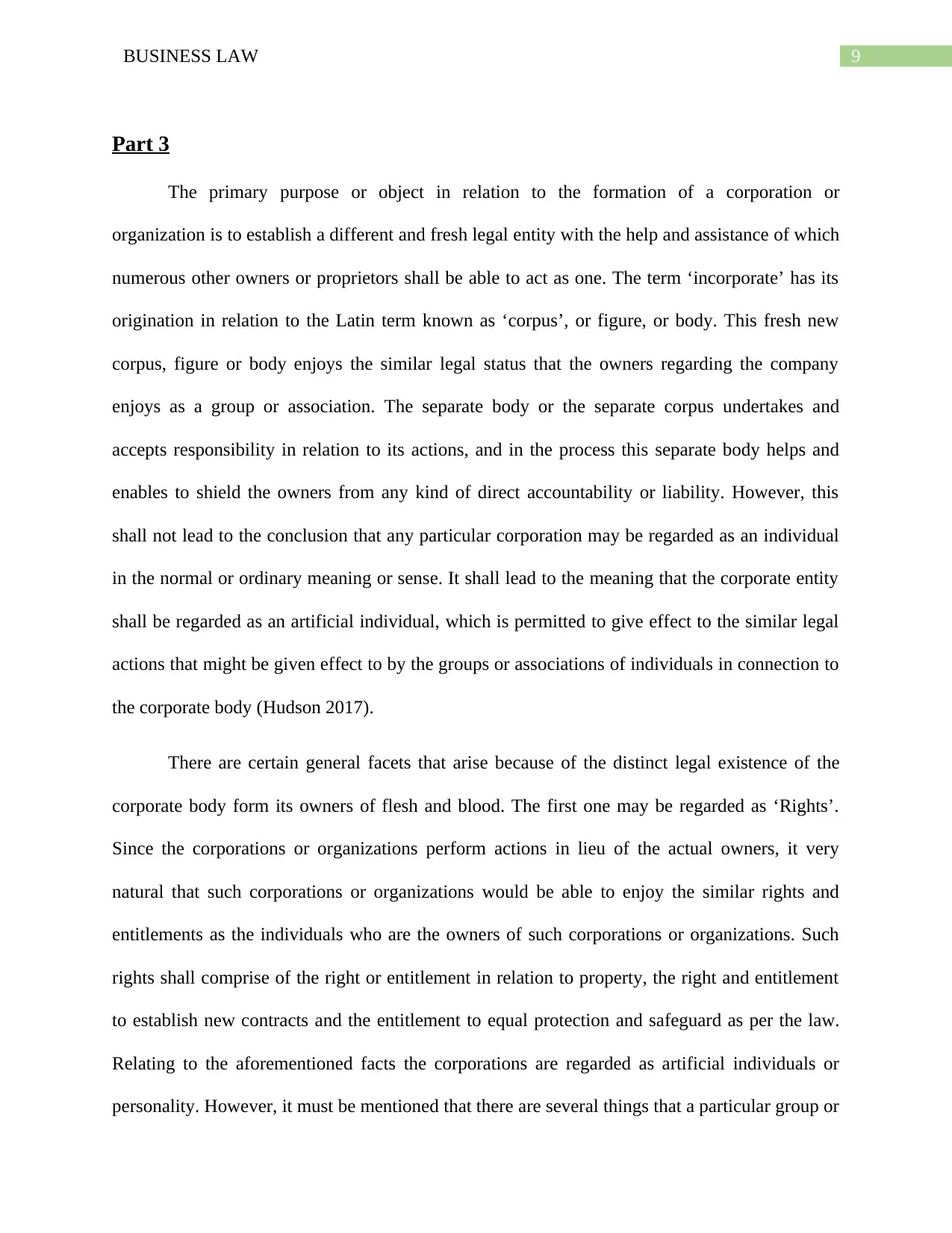
9BUSINESS LAW
Part 3
The primary purpose or object in relation to the formation of a corporation or
organization is to establish a different and fresh legal entity with the help and assistance of which
numerous other owners or proprietors shall be able to act as one. The term ‘incorporate’ has its
origination in relation to the Latin term known as ‘corpus’, or figure, or body. This fresh new
corpus, figure or body enjoys the similar legal status that the owners regarding the company
enjoys as a group or association. The separate body or the separate corpus undertakes and
accepts responsibility in relation to its actions, and in the process this separate body helps and
enables to shield the owners from any kind of direct accountability or liability. However, this
shall not lead to the conclusion that any particular corporation may be regarded as an individual
in the normal or ordinary meaning or sense. It shall lead to the meaning that the corporate entity
shall be regarded as an artificial individual, which is permitted to give effect to the similar legal
actions that might be given effect to by the groups or associations of individuals in connection to
the corporate body (Hudson 2017).
There are certain general facets that arise because of the distinct legal existence of the
corporate body form its owners of flesh and blood. The first one may be regarded as ‘Rights’.
Since the corporations or organizations perform actions in lieu of the actual owners, it very
natural that such corporations or organizations would be able to enjoy the similar rights and
entitlements as the individuals who are the owners of such corporations or organizations. Such
rights shall comprise of the right or entitlement in relation to property, the right and entitlement
to establish new contracts and the entitlement to equal protection and safeguard as per the law.
Relating to the aforementioned facts the corporations are regarded as artificial individuals or
personality. However, it must be mentioned that there are several things that a particular group or
Part 3
The primary purpose or object in relation to the formation of a corporation or
organization is to establish a different and fresh legal entity with the help and assistance of which
numerous other owners or proprietors shall be able to act as one. The term ‘incorporate’ has its
origination in relation to the Latin term known as ‘corpus’, or figure, or body. This fresh new
corpus, figure or body enjoys the similar legal status that the owners regarding the company
enjoys as a group or association. The separate body or the separate corpus undertakes and
accepts responsibility in relation to its actions, and in the process this separate body helps and
enables to shield the owners from any kind of direct accountability or liability. However, this
shall not lead to the conclusion that any particular corporation may be regarded as an individual
in the normal or ordinary meaning or sense. It shall lead to the meaning that the corporate entity
shall be regarded as an artificial individual, which is permitted to give effect to the similar legal
actions that might be given effect to by the groups or associations of individuals in connection to
the corporate body (Hudson 2017).
There are certain general facets that arise because of the distinct legal existence of the
corporate body form its owners of flesh and blood. The first one may be regarded as ‘Rights’.
Since the corporations or organizations perform actions in lieu of the actual owners, it very
natural that such corporations or organizations would be able to enjoy the similar rights and
entitlements as the individuals who are the owners of such corporations or organizations. Such
rights shall comprise of the right or entitlement in relation to property, the right and entitlement
to establish new contracts and the entitlement to equal protection and safeguard as per the law.
Relating to the aforementioned facts the corporations are regarded as artificial individuals or
personality. However, it must be mentioned that there are several things that a particular group or
Paraphrase This Document
Need a fresh take? Get an instant paraphrase of this document with our AI Paraphraser
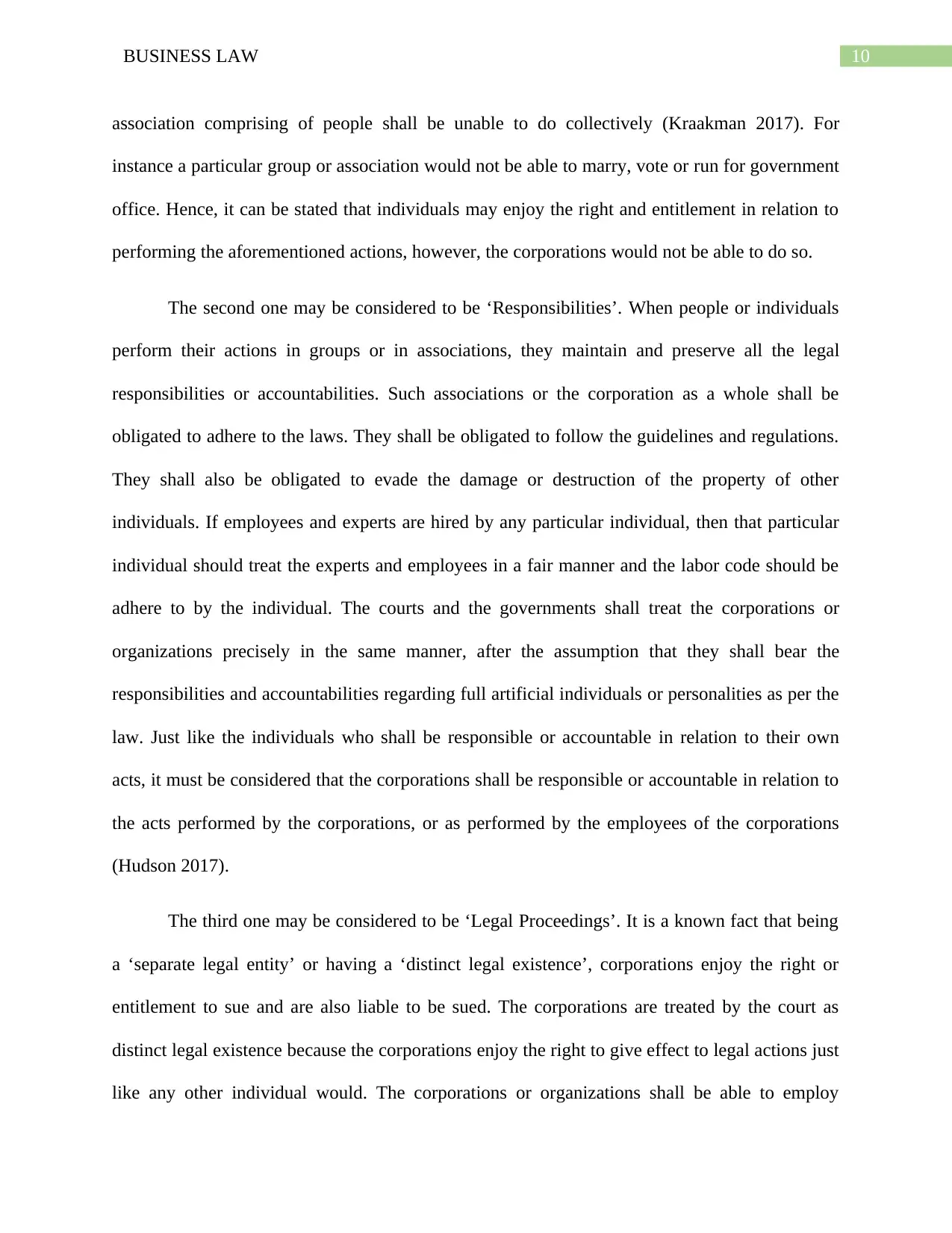
10BUSINESS LAW
association comprising of people shall be unable to do collectively (Kraakman 2017). For
instance a particular group or association would not be able to marry, vote or run for government
office. Hence, it can be stated that individuals may enjoy the right and entitlement in relation to
performing the aforementioned actions, however, the corporations would not be able to do so.
The second one may be considered to be ‘Responsibilities’. When people or individuals
perform their actions in groups or in associations, they maintain and preserve all the legal
responsibilities or accountabilities. Such associations or the corporation as a whole shall be
obligated to adhere to the laws. They shall be obligated to follow the guidelines and regulations.
They shall also be obligated to evade the damage or destruction of the property of other
individuals. If employees and experts are hired by any particular individual, then that particular
individual should treat the experts and employees in a fair manner and the labor code should be
adhere to by the individual. The courts and the governments shall treat the corporations or
organizations precisely in the same manner, after the assumption that they shall bear the
responsibilities and accountabilities regarding full artificial individuals or personalities as per the
law. Just like the individuals who shall be responsible or accountable in relation to their own
acts, it must be considered that the corporations shall be responsible or accountable in relation to
the acts performed by the corporations, or as performed by the employees of the corporations
(Hudson 2017).
The third one may be considered to be ‘Legal Proceedings’. It is a known fact that being
a ‘separate legal entity’ or having a ‘distinct legal existence’, corporations enjoy the right or
entitlement to sue and are also liable to be sued. The corporations are treated by the court as
distinct legal existence because the corporations enjoy the right to give effect to legal actions just
like any other individual would. The corporations or organizations shall be able to employ
association comprising of people shall be unable to do collectively (Kraakman 2017). For
instance a particular group or association would not be able to marry, vote or run for government
office. Hence, it can be stated that individuals may enjoy the right and entitlement in relation to
performing the aforementioned actions, however, the corporations would not be able to do so.
The second one may be considered to be ‘Responsibilities’. When people or individuals
perform their actions in groups or in associations, they maintain and preserve all the legal
responsibilities or accountabilities. Such associations or the corporation as a whole shall be
obligated to adhere to the laws. They shall be obligated to follow the guidelines and regulations.
They shall also be obligated to evade the damage or destruction of the property of other
individuals. If employees and experts are hired by any particular individual, then that particular
individual should treat the experts and employees in a fair manner and the labor code should be
adhere to by the individual. The courts and the governments shall treat the corporations or
organizations precisely in the same manner, after the assumption that they shall bear the
responsibilities and accountabilities regarding full artificial individuals or personalities as per the
law. Just like the individuals who shall be responsible or accountable in relation to their own
acts, it must be considered that the corporations shall be responsible or accountable in relation to
the acts performed by the corporations, or as performed by the employees of the corporations
(Hudson 2017).
The third one may be considered to be ‘Legal Proceedings’. It is a known fact that being
a ‘separate legal entity’ or having a ‘distinct legal existence’, corporations enjoy the right or
entitlement to sue and are also liable to be sued. The corporations are treated by the court as
distinct legal existence because the corporations enjoy the right to give effect to legal actions just
like any other individual would. The corporations or organizations shall be able to employ
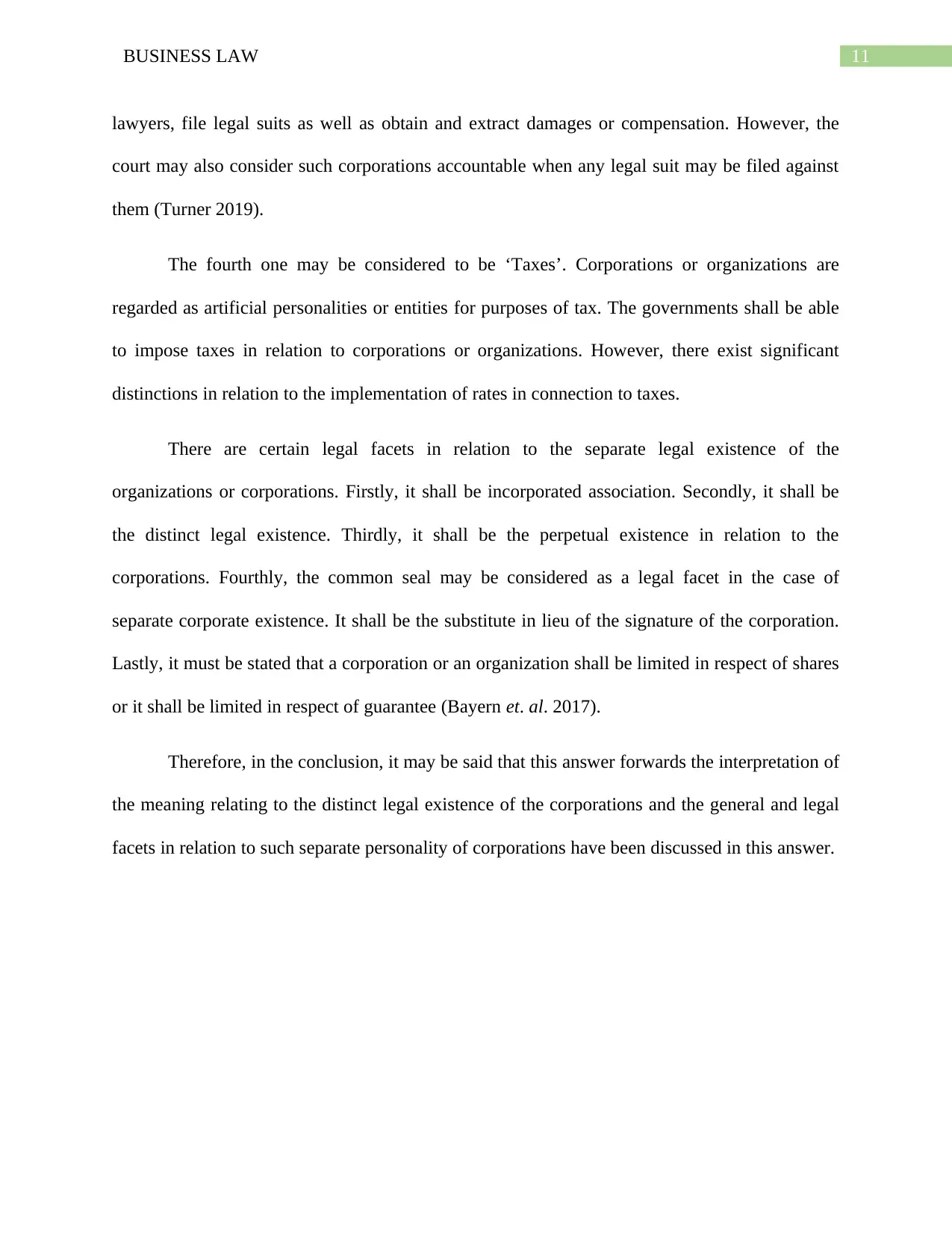
11BUSINESS LAW
lawyers, file legal suits as well as obtain and extract damages or compensation. However, the
court may also consider such corporations accountable when any legal suit may be filed against
them (Turner 2019).
The fourth one may be considered to be ‘Taxes’. Corporations or organizations are
regarded as artificial personalities or entities for purposes of tax. The governments shall be able
to impose taxes in relation to corporations or organizations. However, there exist significant
distinctions in relation to the implementation of rates in connection to taxes.
There are certain legal facets in relation to the separate legal existence of the
organizations or corporations. Firstly, it shall be incorporated association. Secondly, it shall be
the distinct legal existence. Thirdly, it shall be the perpetual existence in relation to the
corporations. Fourthly, the common seal may be considered as a legal facet in the case of
separate corporate existence. It shall be the substitute in lieu of the signature of the corporation.
Lastly, it must be stated that a corporation or an organization shall be limited in respect of shares
or it shall be limited in respect of guarantee (Bayern et. al. 2017).
Therefore, in the conclusion, it may be said that this answer forwards the interpretation of
the meaning relating to the distinct legal existence of the corporations and the general and legal
facets in relation to such separate personality of corporations have been discussed in this answer.
lawyers, file legal suits as well as obtain and extract damages or compensation. However, the
court may also consider such corporations accountable when any legal suit may be filed against
them (Turner 2019).
The fourth one may be considered to be ‘Taxes’. Corporations or organizations are
regarded as artificial personalities or entities for purposes of tax. The governments shall be able
to impose taxes in relation to corporations or organizations. However, there exist significant
distinctions in relation to the implementation of rates in connection to taxes.
There are certain legal facets in relation to the separate legal existence of the
organizations or corporations. Firstly, it shall be incorporated association. Secondly, it shall be
the distinct legal existence. Thirdly, it shall be the perpetual existence in relation to the
corporations. Fourthly, the common seal may be considered as a legal facet in the case of
separate corporate existence. It shall be the substitute in lieu of the signature of the corporation.
Lastly, it must be stated that a corporation or an organization shall be limited in respect of shares
or it shall be limited in respect of guarantee (Bayern et. al. 2017).
Therefore, in the conclusion, it may be said that this answer forwards the interpretation of
the meaning relating to the distinct legal existence of the corporations and the general and legal
facets in relation to such separate personality of corporations have been discussed in this answer.
⊘ This is a preview!⊘
Do you want full access?
Subscribe today to unlock all pages.

Trusted by 1+ million students worldwide
1 out of 13
Related Documents
Your All-in-One AI-Powered Toolkit for Academic Success.
+13062052269
info@desklib.com
Available 24*7 on WhatsApp / Email
![[object Object]](/_next/static/media/star-bottom.7253800d.svg)
Unlock your academic potential
Copyright © 2020–2026 A2Z Services. All Rights Reserved. Developed and managed by ZUCOL.





